Welcome back to A View from The Summit. The Summit Academy is a classical liberal-arts school rooted in the Catholic tradition, located in historic Fredericksburg, Va., and serving students in grades 6-12. This newsletter informs readers about our school and the ways in which it is helping renew education and the Church.
If you’re enjoying this newsletter, please share this newsletter with two other people today. You can do so using the button below. Thank you in advance for considering this request!
Administrative review:
In previous editions, I’ve explained how The Summit acquired 17 acres of land on which to develop our own campus, and how we have applied to the county for the legal ability to do so. Our application for special use has been under official review for the past couple months, and local parents recently contacted their county supervisor(s) to voice support for the school building project. Our aims in this process are to be good neighbors and contribute how we can to the common good of our area. Please continue to keep a successful outcome in your prayers.
Speaking of prayers, it is now Lent. That means, among other things, breaking at mid-day on Ash Wednesday for school mass at the local parish. It also means decreased chances of candy and other treats floating around. And while it does involve a penitential spirit, it doesn’t mean a lack of joy.
Last Friday during lunch period, I was walking the halls when I heard what could only be the excited cadence of a ninth-grade guy: “Jack, I’ve got six more guys for the rosary!” This, I thought, is very neat. And a good sign that, although things are not perfect here at The Summit, there is some positive momentum to do good things together. We give students lots of freedom and lots of free time with the expectation that they will manage their time and selves responsibly, or at least, continue getting better at doing so.
Now for the fun. Last week, most upper-school students took advantage of the half-day ski trip. (Many even understandably skipped out on my elective to do so, though several attended a lunchtime review session on savings and investment.) We have some skiers, some snowboarders, and some novices. The trip was, by all accounts, a great time had by all. Being outside, especially to experience nature’s beauty and to push ourselves, is an essential part of a Summit education.
Not so essential but new this year were two events inspired by Valentine’s Day. On the Monday prior, we extended the upper-school lunch period. Guys went outside for a Mr. Williams-organized event, while girls went to the cafeteria for their own festivities.
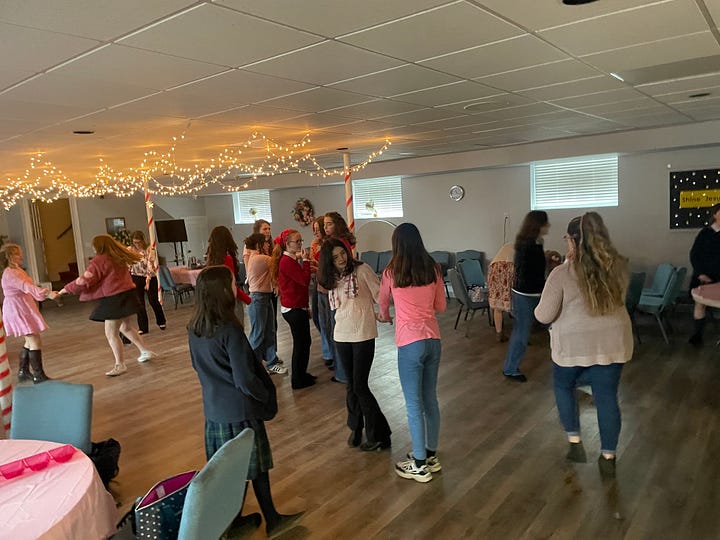
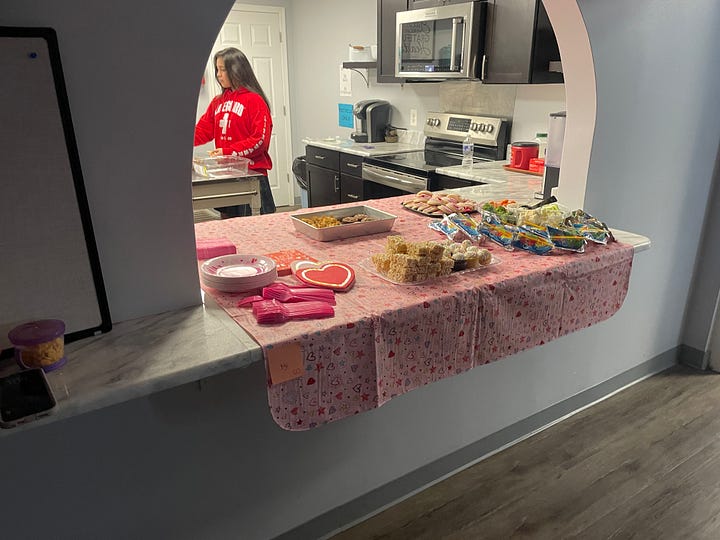
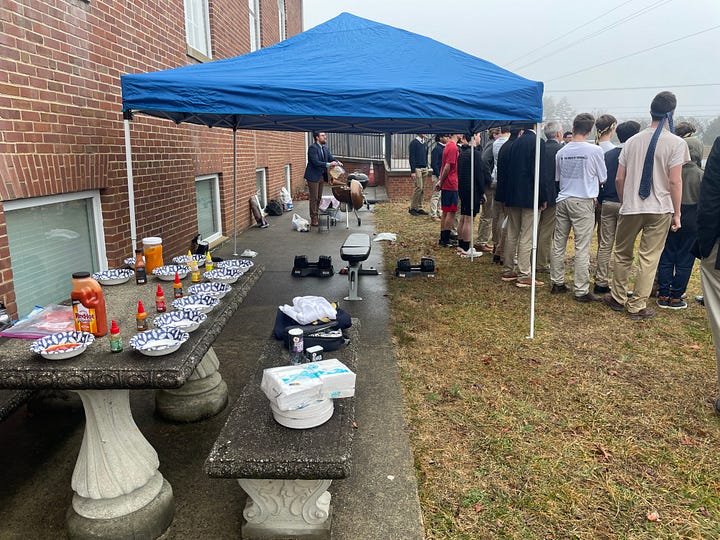
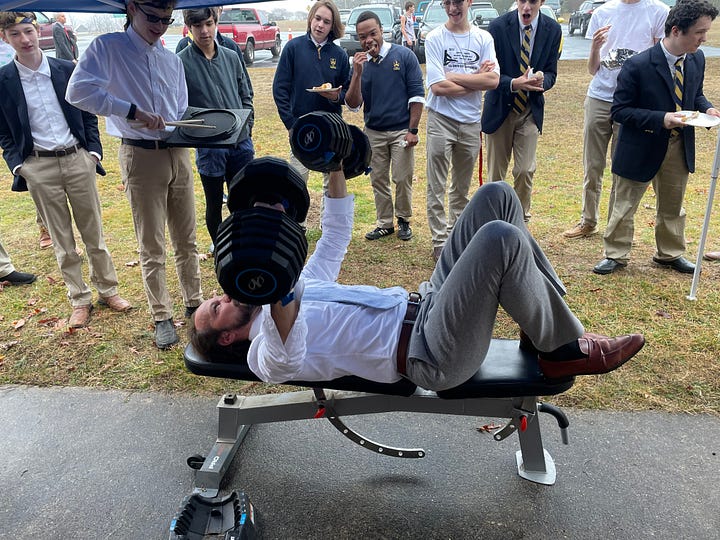
The former had cold, rainy weather, a variation of the St. Crispin’s Day speech, chicken drumsticks with increasingly intense hot sauces, a dumbbell bench-press competition, frisbee, and a whole lot of fun. The latter enjoyed large decorated platters of charcuterie and treats, karaoke and dancing, and (presumably, though I was not there) a whole lot of fun. These events were highly anticipated and, I think, richly rewarding in what tends to feel like a very long month.
Faculty & curriculum insight:
In the last edition of this newsletter, we covered Headmaster Julian Malcolm’s senior-level theology course. His students are reading Carl Trueman’s book Strange New World: How Thinkers and Activists Redefined Identity and Revolution and contrasting the modern way of self-identity with the teachings of St. John Paul II about human nature and identity. Last week, Dr. Trueman kindly spent time with the class via Zoom. These events prompted my own reflection on the purpose of education at The Summit. I started working here because I saw a unique opportunity to help build something I wish I had long ago: An education that helped me make sense of my freedom. This edition’s insight is my own.
Modern American culture equates freedom with autonomy. Much has been written about autonomy and its influence on our politics, culture, and self-conception. In a 1984 journal article, Harvard philosopher Michael Sandel explained the concept of the unencumbered self in this way: “[W]hat is most essential to our personhood are not the ends we choose but the capacity to choose them.” This identity carries with it certain consequences potentially destructive to political and social life:
Understood as unencumbered selves, we are of course free to join in voluntary association with others, and so are capable of community in the cooperative sense. What is denied to the unencumbered self is the possibility of membership in any community bound by moral ties antecedent to choice; he cannot belong to any community where the self itself could be at stake.
More recently, Reformed scholar Carl Trueman has written about the philosophic roots of the modern self. The essence of the modern self is the ability to choose according to one’s inner feelings or desires. The menu of options is whatever technology allows, unencumbered by limits of nature or tradition. Our collection of choices then constitutes our identity, which we broadcast through social media. We are what we choose.
This process, which we can call self-invention, becomes the primary task of each young person. And facilitating the process of self-invention becomes the primary task of educators, both public and private. Don’t take my word for it. Simply look up the slogans or mission statements of your local colleges or independent schools.
The Summit Academy exists to teach a different view of human freedom: freedom as the ability to choose the good. We believe not in spending time inventing ourselves, but rather in becoming who we already are.
The differences are not merely semantic. One view of freedom rejects that nature and tradition have anything valuable to teach us; the other respects both. One view sees our created nature as something to be changed and manipulated; the other sees it as a gift worth honoring. One view prioritizes choice over obligation; the other balances freedom and responsibility.
Getting that balance right is exceptionally difficult and exceptionally important. It’s difficult in an age when freedom means autonomy, and it’s important at a time when opportunities to grow and mature are getting kicked further and further down the road. Getting that balance right requires parents, teachers, and entire communities to share the same mission and vision. And getting that balance right is what The Summit aims to do.
So, our administrators, teachers, and students spend their days much differently than the average American involved in education. At the top level, we prioritize our partnership with parents. We know that the right balance between freedom and responsibility cannot be struck without the buy-in, feedback, or guidance of parents. We build relationships with parents through happy hours and reading groups, and we meet regularly with each student’s parents to review progress, discuss challenges, and suggest—even with the strongest students—areas for growth.
Day in and day out, our students are far away from their screens, delving into the great texts, exploring through Socratic dialogue the big questions of life, figuring out math problems for themselves, preparing for Senior Thesis presentations, and challenging one another through the Outdoor Program. Summit students benefit from the faithful witness and intentional care of their teachers, daily prayer, robust community life, and access to the sacraments.
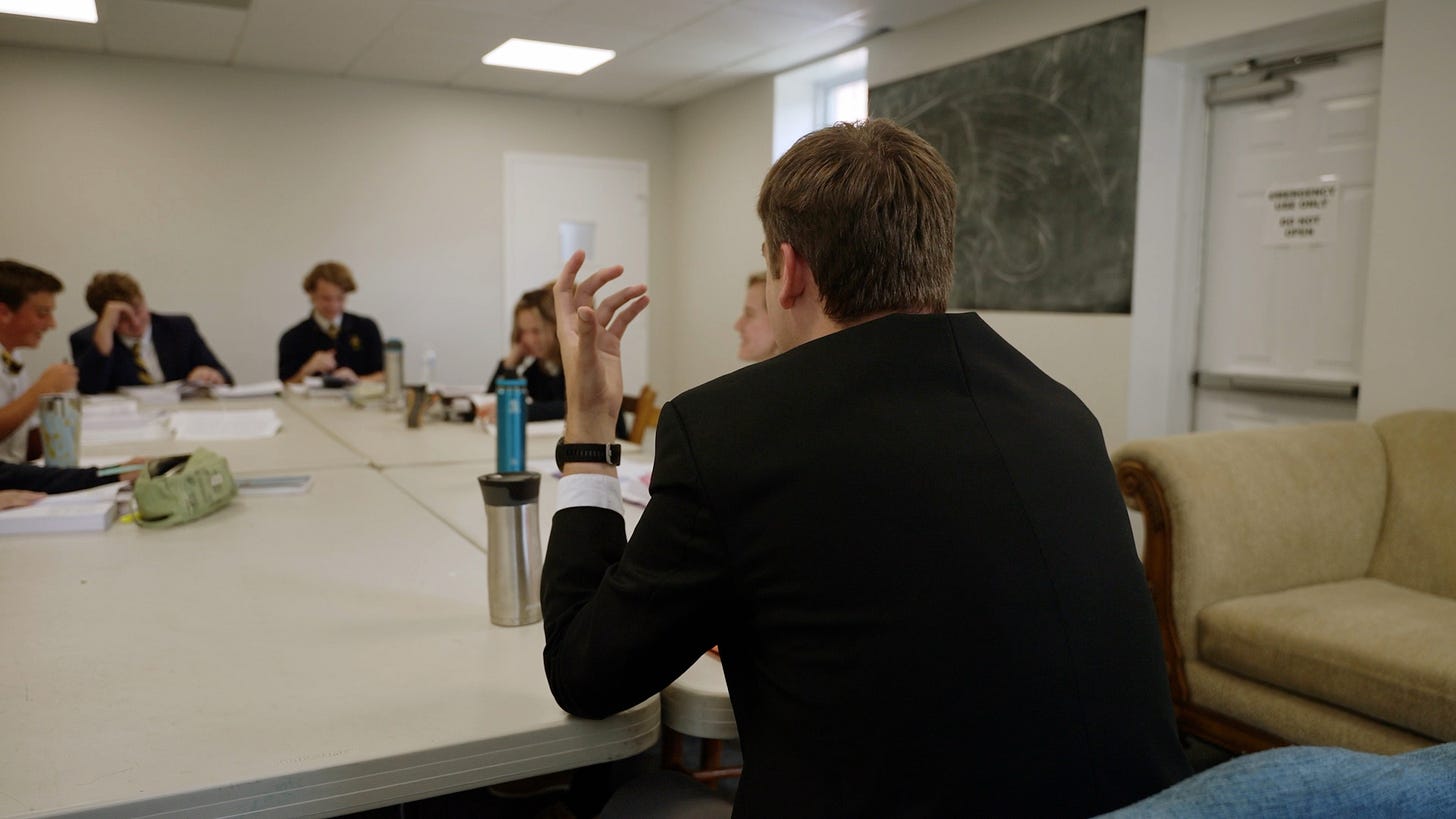
Not everything is perfect here. We face plenty of challenges, social and otherwise. But each challenge represents the opportunity to grow, and viewing them as such is most important. We know that middle and high school are merely stops on a much longer journey. But we take seriously our students want to discover how they should live, and they will graduate with the confidence that they can live faithfully and joyfully in our modern world.
Co-curricular highlights:
Next month, our parent-faculty reading group is back. I will be leading a session on Fr. Gregory Pine’s book Prudence: Choose Confidently, Live Boldly (OSV, 2022). I’m grateful to the new local bookseller Rex Rappahanock for making discounted copies of the book available.
I have written before about this initiative, launched last year by Mr. Williams:
Such programs raise the question of how we might convince parents to sacrifice an hour or two on a weekday afternoon to sit down, read, and discuss the Great Books? Many parents are even busier than our teachers. First, it’s incumbent on us to make the program worthwhile and practical. Second, we have to explain why this kind of activity is important. In brief, the more parents choose to engage with the substance of their child’s education, the more fruitful that education will be, since good formation does not begin and end during the school day. There is perhaps no better way for parents to engage with their child’s education than to actually try it out for themselves in the form of a Socratic discussion.
We will continue to experiment with new ways to engage our parents, the primary educators of their children whom they entrust to us during school hours. The more we can form and assist parents, the more we are able to fulfill our mission.
So, if you are an interested Summit parent, please stay tuned for more details and plan to participate in our March meeting.
What we’re reading:
As Lent gets underway, I am reading through the Psalms. I’ve heard it said that during Lent we must pair giving up vices with encountering God’s love, and I know of few better ways to meditate on His goodness than these beautiful prayers.
I am also continuing to read Cal Newport’s books in an effort to figure out how best we should work in today’s world. High-quality work usually requires uninterrupted focus, and the way we as a society have set things up gives us everything but that. We have meetings, emails, video calls, and more, but rarely do we have that valuable time—outside of the early morning or late night—to simply think. Newport gives us insightful counsel on these points.
A bit less practically, I am revisiting Tocqueville’s Democracy in America. One of my favorite college classes, one that opened my eyes to the value of philosophy, was about this book and only this book. I suppose this makes me one of the few who has read it cover to cover, but then only because I was required to do so. Now, I am rediscovering the Frenchman’s adroit observations and insights into human nature, American economic development, and so much more.
If you are enjoying this newsletter, please consider subscribing via the button above and sending it along to others who might be interested. Revenue from paid subscriptions will support The Summit Academy of Central Virginia.

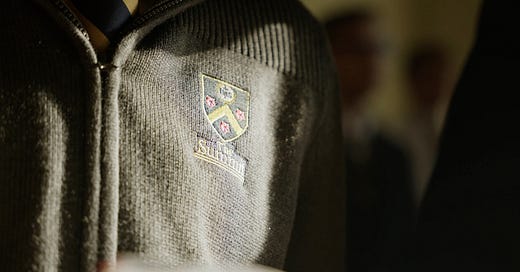



I also read Tocqueville's "Democracy in America" cover to cover for a college course. (Proof that there's still a lot to be gained from a university education if you know where to look). He has some piercing insights on the American understanding of freedom.
As Christ tells us, truth and freedom are inextricably bound: "If you continue in my word, you are truly my disciples, and you will know the truth and the truth will make you free" (Jn 8:31-32). There's the task of education – to inspire followers of the truth.
God bless the Summit Academy for knowing its mission.